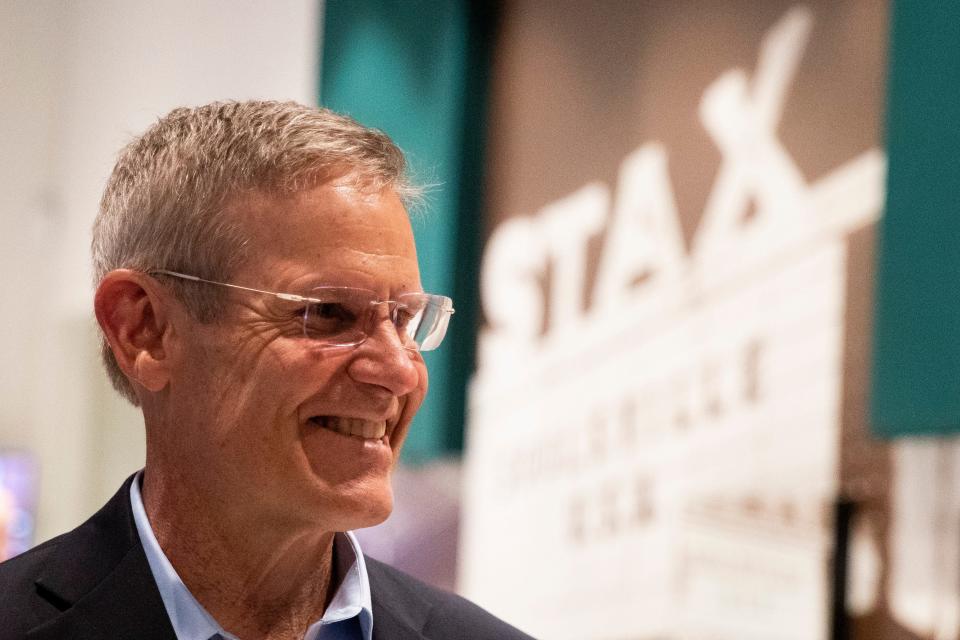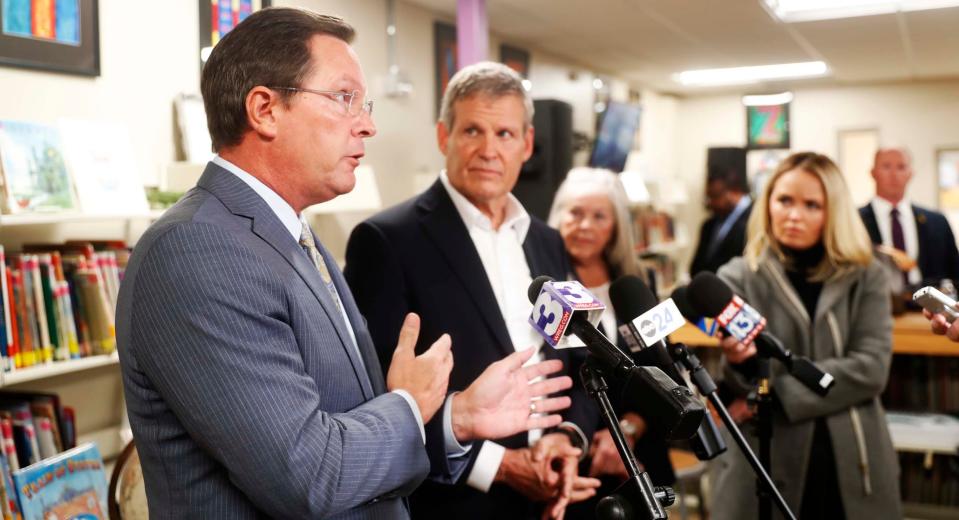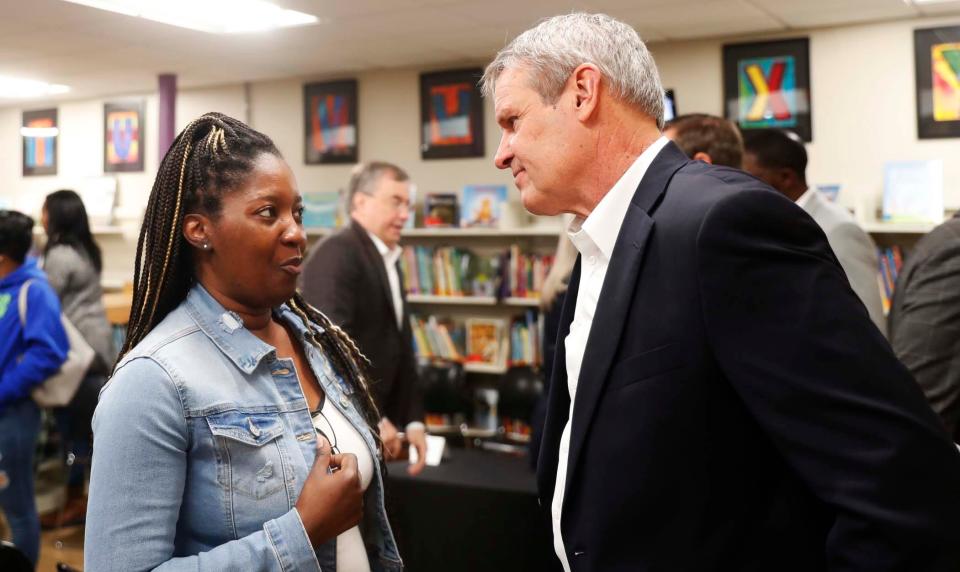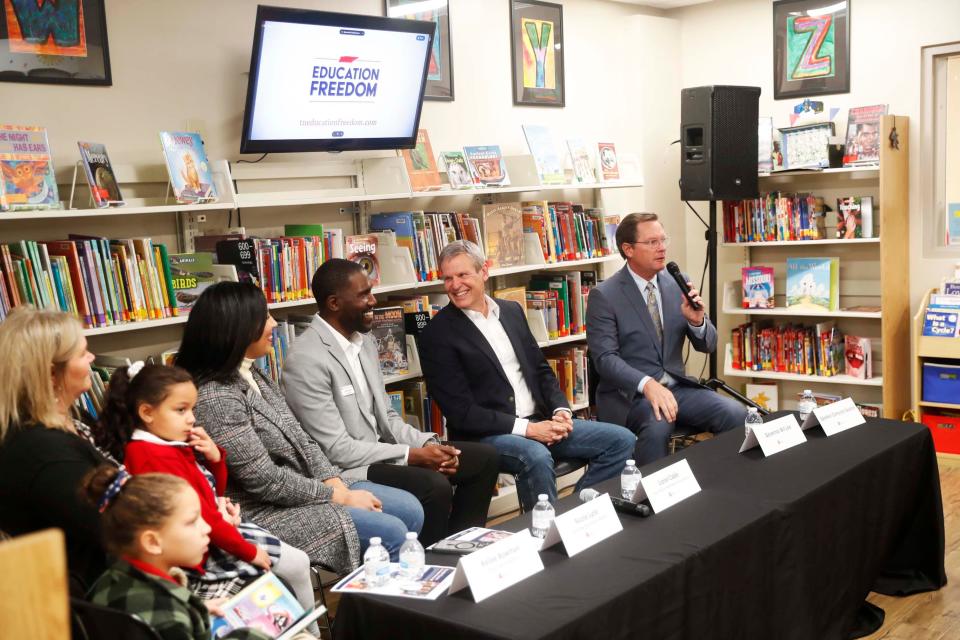School voucher voter polls vary in Tennessee, many legislative candidates skirt the issue
This story was originally published by Chalkbeat. Sign up for their newsletters at ckbe.at/newsletters
While Gov. Bill Lee’s universal school voucher proposal is clearly a key issue this election year, there is less agreement on where Tennessee voters stand on the contentious education policy, incentivizing many state legislative candidates to avoid discussing the matter.
Numerous voter polls have generated wildly different results this year, depending on which organization was behind the survey and how the questions were asked.
As a result, rural Republican candidates, whose legislative votes would be pivotal in deciding the issue, aren’t generally trumpeting their positions on what would amount to a major policy change.
And when they do comment, the candidates are choosing their words carefully by using the language of “school choice” over “vouchers,” even though they’re essentially the same thing when it comes to letting parents use taxpayer money to send their children to private schools.
The divergent poll results, based on representative samplings of voters, underscore that vouchers remain a hot-button education issue as Tennesseans try to understand a complex idea that was the most divisive of the recent legislative session.
More: 'Change to the status quo:' Gov. Bill Lee talks commitment to vouchers during Memphis visit
Previous coverage: 'Cannot stay silent:' Memphis school leaders react to TN voucher bill's failure
Supporters say the statewide voucher proposal, which the governor vowed to bring back to lawmakers next year after it failed to reach the Senate and House floors in April, would put parents in charge of their children’s education by giving them more choices. Critics say it would destabilize public education, bust the state’s budget, and further segregate schools by race, income, and students with special needs.
Now in his second term, Lee has characterized GOP support across Tennessee as solidly favoring his proposal, which is especially important in a red state where the winner of the Republican primary typically wins the general election.
The Republican governor, who campaigned on the promise of giving parents more education choices for their children, recently told Fox News that school choice is “a very popular idea among Republican primary voters.” He added that voters support it “by an overwhelming margin.”
“Legislators understand that; they know their voters want this,” Lee said.

But while vouchers have steadily gained support through the years, surveys of voter attitudes don’t necessarily bear out Lee’s claim.
Three pro-voucher groups — The Beacon Center, Americans for Prosperity, and the American Federation for Children — released findings early this year declaring broad support for expanding school vouchers in Tennessee as they sought to build momentum ahead of critical voucher votes in the General Assembly.
During the same period, the Tennessee Education Association, the state’s largest teachers organization and a voucher opponent, released results of its own poll showing only 30% of Republican primary voters supported the governor’s plan.
Most recently, Vanderbilt University’s poll found Tennessee voters evenly split on the matter.
When asked if they approve of the policy, 45% were in favor of vouchers, 46% opposed them, and 9% said they neither supported nor opposed the idea.

“These results show that vouchers remain a controversial issue,” said John Geer, the Vanderbilt poll’s co-director and a distinguished professor of political science.
“It is a complex and complicated topic,” he added. “That makes the issue difficult to measure in a poll.”
The uneven findings of various polls stem, in part, from how the questions were framed.
For instance, Americans for Prosperity asked voters: “Governor Lee is proposing a school choice program that will enable parents to take back control over $7K of their education tax dollars to educate their child in a private or home school environment if they choose to, giving parents more control over how and where their children are educated. Do you agree with the program Governor Lee is proposing?”
More than 70% responded ‘yes.’
By contrast, the TEA’s survey asked a series of questions delving into the structural and financial impacts that universal vouchers would have on the state’s public education system.

Among them: “Other states that have enacted statewide vouchers saw that 95% of students who benefitted were from wealthy families who had the resources to send their children to private schools or already attended private schools, mostly in rural areas, instead of providing resources to middle-income families and students from across the state. Does knowing this make you more or less likely to support school vouchers?”
More than 70% responded that they were less inclined to support the policy.
The Vanderbilt poll, which also examined issues such as abortion, vaccines, and gun control, was conducted this spring, soon after the legislature adjourned.
On vouchers, Vanderbilt pollsters asked: “Do you support, neither support nor oppose, or oppose Tennessee giving all parents tax-funded vouchers they can use to help pay for tuition for their school-age children to attend private or religious schools of their choice, instead of attending local public schools?”
“We don’t have an ax to grind, so we tried to be as straightforward as we could,” said Geer.
MSCS job cuts: Superintendent Feagins apologizes to staff, but stands by proposed shakeups
More: MSCS third, fourth grade TCAP reading scores increase. What it means for students
About 49% of responding voters also said they were likely to use vouchers if they became available, and 50% said they would not. By a wide margin, Republicans who support former President Donald Trump were the group most likely to use them, while only 26% of Democrats said they would take advantage of the option.
“The outcome of the poll on vouchers was very partisan in nature,” Geer said.
That partisan lens, he added, was more significant than whether the voter lived in a rural, urban, or suburban district, where access to private schools varies significantly.
“I think it’s another statement about our political climate and the polarization of our country. We really weren’t able to get past the partisanship,” he said.
This year’s uneven polling results may help explain why many rural Republican candidates aren’t discussing vouchers or promoting where they stand on the issue when seeking to secure their party’s nomination. In suburban and urban districts, which are home to more private schools, both Republican and Democratic candidates are more likely to weigh in or use vouchers as a campaign issue.

“Rural Republican legislators got some pushback over the governor’s voucher proposal, so I can understand why they would skirt the issue with primary voters,” Geer said. “I can understand why they would just say: ‘I’m for public education because that’s what’s important to my rural district.’”
Debby Gould, president of the League of Women Voters in Tennessee, said legislative candidates can easily cloak their voucher stance by saying they support public education, especially since the House’s 2024 voucher bill bundled the creation of a statewide voucher program with public school reforms.
“That muddied the waters a bit, but voters deserve a clear answer to whether they plan to vote ‘yes’ or ‘no’ on universal vouchers,” Gould said.
“Vouchers aren’t a secondary election issue,” she added. “Gov. Lee has said it’s a priority for his administration, so it will be front and center next legislative session.”
All 99 seats in the state House and half of the Senate’s 33 seats are on the ballot this year. Aug. 1 is Tennessee’s primary election day, with early voting July 12-24. The general election will be on Nov. 5.
You can find more voter information on the Secretary of State’s website.
Marta Aldrich is a senior correspondent and covers the statehouse for Chalkbeat Tennessee. Contact her at maldrich@chalkbeat.org.
Chalkbeat is a nonprofit news site covering educational change in public schools.
This article originally appeared on Memphis Commercial Appeal: Tennessee voucher voter polls vary widely, candidates avoid the issue

